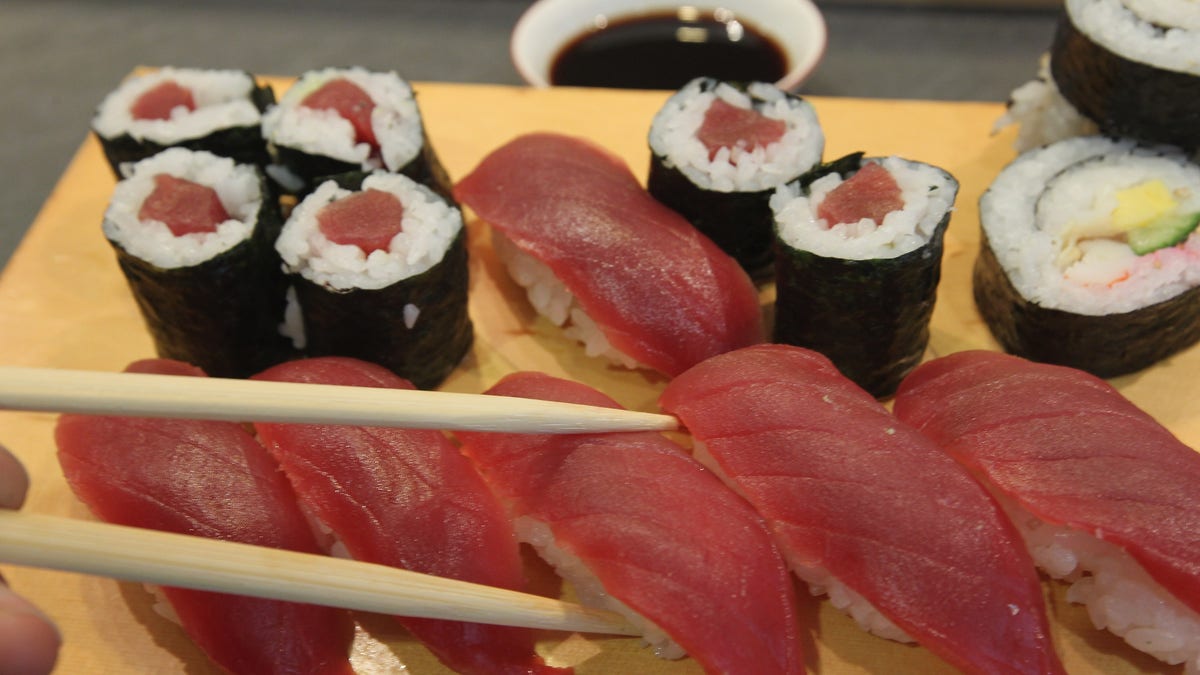
BERLIN - NOVEMBER 23: Sushi from yellowfin, or maguro, tuna lies on a customer's plate at a sushi restaurant on November 23, 2010 in Berlin, Germany. Yellowfin tuna is mostly fished in the Atlantic and is among the cheaper and more plentiful varieties of tuna. (Photo by Sean Gallup/Getty Images) (2010 Getty Images)
Japan has long been known for providing some of the best sushi-grade fish and premium meats (think Kobe Beef) in the world. But some are wondering: can a worst-case scenario nuclear meltdown in Japan affect our food supply?
Experts say a Japan nuclear radiation disaster could potentially contaminate vegetables, fruits, meats, dairy, and fish, but the international threat is not as serious as the domestic concern.
But countries all across the world are already reacting to fears.
The European Union is urging member states to check Japanese food imports for radioactivity following the country's nuclear crisis. Regulators in India, South Korea, Hong Kong, Singapore and the Philippines are beginning tests on Japanese imports. No contamination has been reported yet. The U.S. Food and Drug Administration, meanwhile, has also said it is stepping up radiation testing on its imports from Japan.
The full effects of radiation are dependent on which way the wind is blowing, experts say. Currently, that wind is expected to continue to blow eastward over the Pacific Ocean, dispersing nuclear radiation over thousands of square miles of salty ocean.
Dr. Robert Atcher, past President of the Society of Nuclear Medicine and Chair of the Task group on Medical Isotopes , said the thousands of miles between the United States and Japan will lessen the effects of possible nuclear fallout because any particles would be diluted once it crosses the ocean. The direct affects would be very minimal, even in a worst case scenario situation, he said.
“The advantage there is the radioactivity will go in the water, disperse over a large area and the contamination would be less concentrated, “ Atcher said.
But, if the wind blows westward over Japan after a worst case scenario nuclear meltdown, the immediate concern would then be Japan’s domestic food supply.
The threat to the food supply lives inside of Japan’s nuclear reactor cores, which are comprised of radioactive isotopes iodine 131, Caesium, and Strontium.
If a nuclear meltdown were to occur, experts say, radioactive fallout would release these isotopes – which could attach to dust particles and enter the atmosphere. If this happens, the radioactive materials become water vapor and contaminate the soil in the form of rain.
Radiation fallout from a meltdown would result in two forms of contamination. One is the immediate contact contamination, in which radiation particles directly settle on the surface and are not ingested by either plants or animals. In this case, immediate contamination of plants, fruits, animals, and humans can simply be washed away with water.
The more concerning type of contamination occurs when dangerous radioactive materials become ingested through the food chain in a process called food uptake. Radioactive isotopes fall to the soil as rain, contaminating the grass, which is then eaten by cows, thus tainting the meat and milk.
“Biological systems, particularly animals, can compound the problem,” said Paul Carroll, Program Director Ploughshares Fund, a California-based international nuclear security foundation. “For example, a contaminated sardine gets eaten by a tuna and through biological uptake the process can continue as each successive body then consumes another body.”
These processes can affect children more so than adults because they are more likely to consume things like milk, for instance, and are more susceptible to radiation.
The severity of this contamination depends on the life of the radioactive isotopes that would be released if a meltdown were to occur. Some like iodine 131, would only affect humans if plants and vegetables were consumed immediately after contamination because they quickly degrade. Others, like caesium, are more dangerous because they remain radioactive for about 28 years.
But even if radiation is ingested in the Japanese food chain, Atcher believes the United States does not need to panic about contamination because of today’s highly sensitive radiation-detection equipment.
“The nuclear equipment can detect nuclear radiation levels far below anything that is at risk to animals, humans, or plants,” he said.
Contact Bryan Llenas at bryan.llenas@foxnewslatino.com or follow him at twitter @LlenasLatino.
Follow us on twitter.com/foxnewslatino
Like us at facebook.com/foxnewslatino








































